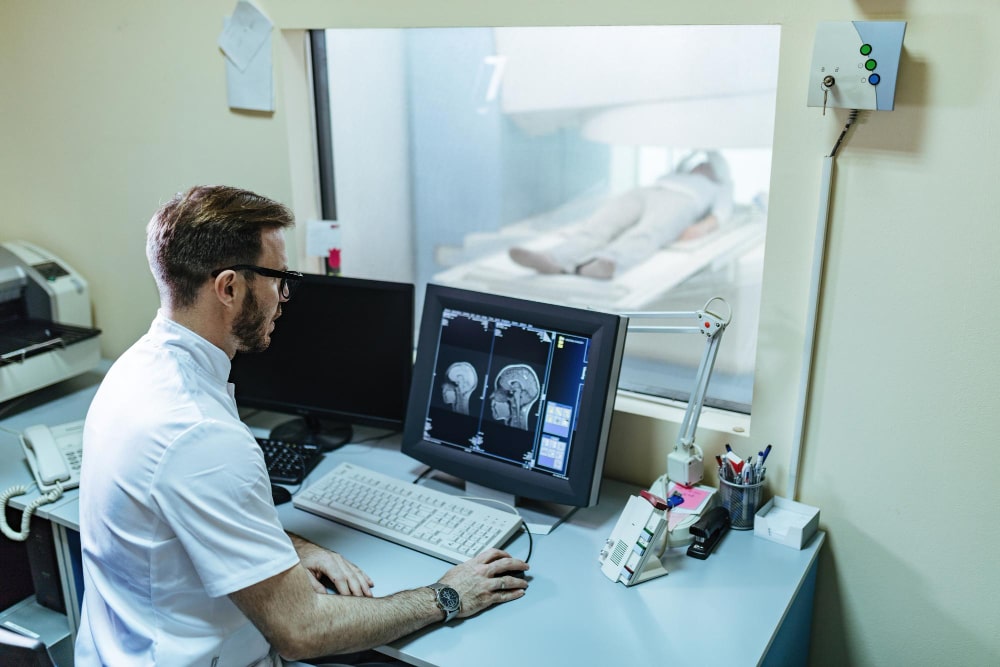A CT scan of the brain is a sophisticated imaging technique designed specifically to examine the brain for the presence of tumors. This scan employs X-ray technology to create highly detailed images of the brain's interior.
Unlike conventional X-rays, which offer two-dimensional views, a CT scan provides a three-dimensional perspective. This is accomplished by taking a series of X-ray images from various angles around the head.
Subsequently, these images are processed by a computer to generate comprehensive cross-sectional slices of the brain. In this article, we’ll discuss CT scans, how much a CT scan brain costs, and the different procedures involved in the process.
CT Scan for Brain Tumors
The beauty of a CT scan lies in its ability to detect even the subtlest structural abnormalities within the brain, including the presence of tumors. When a tumor develops, it disrupts the brain's natural architecture, causing variations in density that can be readily identified by the CT scanner. This diagnostic capability places CT scans at the forefront of brain tumor diagnosis and monitoring.
So, why are these scans so crucial in the context of brain tumors? The answer lies in their unmatched ability to provide timely and accurate information. When a patient exhibits symptoms like persistent headaches, seizures, or neurological deficits, a healthcare provider may recommend a CT scan for brain tumors.
This initial step serves multiple purposes: ruling out other potential causes of the symptoms, identifying the tumor's location, size, and shape, and determining its impact on surrounding brain tissue.
The Role of Contrast
In some cases, contrast material, often referred to as contrast dye, may be administered to enhance the visibility of certain brain structures and abnormalities.
This contrast material is usually injected into a vein in the patient's arm before the CT scan of the brain or any other part. It travels through the bloodstream and highlights areas with abnormal blood flow, such as tumors. This can be particularly useful in the CT scan of the brain to help distinguish between different types of brain tumors and assess their vascularity.
Early Detection
One of the most significant advantages of brain CT scans in the context of tumor detection is their ability to detect abnormalities in the early stages.
When a tumor is discovered early, it may be smaller in size and less likely to have caused extensive damage to surrounding brain tissue. This can open the door to a range of treatment options, including surgery, radiation therapy, and chemotherapy, that have a higher chance of being effective.
Monitoring and Guidance
CT scans are not only valuable in diagnosing brain tumors but also in monitoring their progress over time. For individuals undergoing treatment, regular CT scans can provide essential information about how the tumor is responding to therapy. This allows healthcare providers to make necessary adjustments to the treatment plan and optimize the patient's care.
Cost and Procedures of a Brain CT Scan
A CT scan brain cost may vary depending on the following factors:
|
Aspect
|
Cost (Approximate)
|
Procedure
|
|
Facility Type
|
Varies
|
CT scans of the brain can be performed at hospitals, clinics, and diagnostic centers. Costs may vary depending on the facility.
|
|
Scan Type
|
$300 - $3,000
|
The cost depends on whether it's a routine or specialized CT scan, like a CT angiography or perfusion scan.
|
|
Insurance Coverage
|
Varies
|
Coverage depends on your insurance plan. Some plans fully cover CT scans, while others require co-pays or deductibles.
|
|
Location
|
Varies by Region
|
Costs can vary significantly by location and healthcare market. Urban areas may have higher prices than rural ones.
|
|
Preparation
|
Minimal
|
Generally, little to no special preparation is required. You may be asked to remove metal objects and jewelry.
|
|
Contrast Dye
|
$50 - $200
|
Contrast dye may be used to enhance imaging. This incurs an additional cost and may require allergy testing beforehand.
|
|
Sedation (if needed)
|
$100 - $500
|
If the patient requires sedation due to claustrophobia or other reasons, this adds to the overall cost.
|
|
Follow-up Consultation
|
$50 - $200
|
After the scan, you may need to consult with a doctor to discuss the results. The cost varies by healthcare provider.
|
|
Total Cost Range
|
$400 - $4,000
|
The total CT scan brain cost can vary widely based on factors like location, scan type, and whether contrast or sedation is needed.
|
MRI Brain Scan
Magnetic Resonance Imaging or MRI harnesses the power of robust magnets and radio waves to craft intricate depictions of the brain.
In contrast to CT scans, MRI doesn't rely on ionizing radiation, rendering it a more secure alternative, particularly when repeated scans are required.
MRI is renowned for its exceptional capabilities in rendering high-definition visuals, making it a prime choice for identifying irregularities in the brain's tissues
MRI vs CT Scan Brain: Key Differences
Radiation Exposure
Perhaps the most significant difference lies in radiation exposure. CT scans use X-rays, exposing patients to ionizing radiation. In contrast, MRI does not involve ionizing radiation, making it a safer option, especially for individuals requiring multiple scans or pregnant women.
Soft Tissue Detail
MRI excels in providing detailed soft tissue contrast, allowing for the detection of subtle abnormalities in the brain's structure. CT scans are better suited for visualizing bony structures and detecting acute bleeding.
Safety
MRI is considered safer overall due to the absence of ionizing radiation. However, it may not be suitable for patients with certain medical implants or claustrophobia.
Duration and Noise
CT scans are typically quicker than MRI scans. MRI scans can be noisy due to the banging sounds produced by the magnets, which may require ear protection.
Contrast Agents
Both MRI and CT scans can benefit from the use of contrast agents, which enhance the visibility of specific structures or abnormalities. The choice of contrast depends on the clinical situation and patient factors.
Making the Right Choice
The choice between an MRI and a CT scan for brain imaging depends on several factors, including the patient's medical history, the specific clinical question, and the physician's expertise. In many cases, both imaging modalities complement each other, providing a comprehensive assessment of brain health.
For example, in the case of acute head trauma, a CT scan is often the initial choice to rule out bleeding or fractures. If further evaluation is needed to assess soft tissue injuries or complications, an MRI may follow.
In scenarios where a brain tumor is suspected, an MRI is typically the preferred initial imaging tool due to its superior soft tissue resolution. It can precisely identify the tumor's location, size, and characteristics, guiding treatment decisions.
Conclusion
In conclusion, brain CT scans are an indispensable tool in the diagnosis and monitoring of brain tumors. Their ability to detect even the subtlest structural abnormalities within the brain, including the presence of tumors, is a testament to their diagnostic prowess.
On the other hand, MRI, with its radiation-free approach, offers exceptional soft tissue contrast and three-dimensional images, making it an invaluable tool for identifying brain abnormalities.
These diagnostic tools have transformed the field of neurology and neurosurgery, offering valuable insights that guide treatment decisions, improve patient care, and enhance outcomes for individuals facing the challenges of brain-related conditions.
If you're looking for crucial insights into your health, look no further than Cura4U, which offers specialized healthcare at the tip of your fingers. Whether you're interested in booking online doctor consultations or scheduling essential medical tests, Cura4U offers a comprehensive list of services, making it your one-stop destination for all your healthcare needs.












